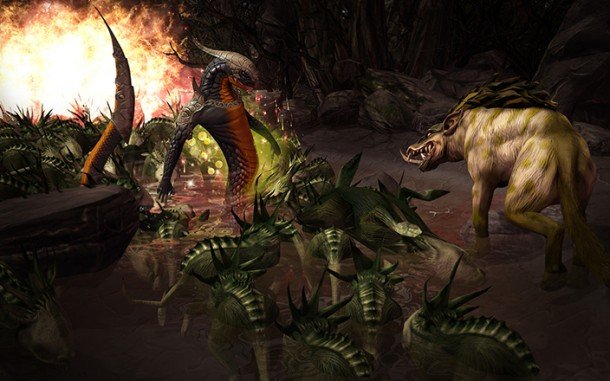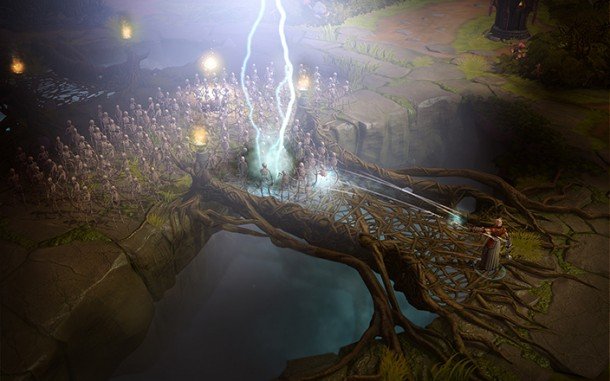Sins of A Dark Age cuts Commander role, closed beta now available for purchase

PCG: Can you walk me through the changes to Sins of A Dark Age you're announcing today?
Blair Fraser, producer and co-founder: Our original premise was MOBA meets RTS. We were kind of coming full circle back to Warcraft III, where DOTA was the MOBA and Warcraft III was the inspiration. We wanted to try to bring some of those elements back in. That didn't work. We spent a lot of time and effort making that work, and I can dive into lots of reasons about it if you want. But instead, what we started to do was look at some of the other new elements we were bringing in in parallel. We decided that some of those were a much more natural fit to put more development effort into and create more content for. One of those is what we call Realm Quests. The reason we think it's a more natural fit is, it's really expanding on the RPG aspects of MOBAs, where MOBAs are kind of that RPG/RTS… That's kind of the initial seed. We've cut out the RTS expansion and we're improving on and expanding the RPG aspects. One of the most natural things that you think of in RPGs is doing quests. Now, we can't just take RPG and MMO-type quests and move them in verbatim. That's just kind of the inspiration.
To give an example, and then we can get into the details, to put a picture in your head of something… Imagine you're playing on a classic three-lane map where the waves move down the lane and there's stuff in the jungle to kill and all that sort of stuff. Now, behind the scenes, there's a quest director. It's basically an AI that's constantly evaluating the state of the game and looking for opportunities to spawn quests that meet various criteria. The number one criterion is that it's fair to both teams. It's still a skill-based game. We have to minimize any impact on that. It has to be fair. Now, let's say, in this example, it decides to spawn something that's called the "Troll on the Bridge" quest. That's just a temporary name, but it accurately describes what happens. A giant special creep, a troll, spawns in the center lane bridge, and all the minions in that lane are now shut down. It's just this giant boss in the center. All players are informed that this quest is now active. They don't have to do anything about it. They can continue to do their normal MOBA-type activities or any of the other new things we've added. But if they do decide to do it, they can go out and try to engage this giant thing and fight it out like a boss. If they kill it, they'll get the gold and experience for it, and they'll probably be fighting over it with the other team, just like a Dragon or Baron fight in League of Legends or the equivalent in any other MOBA.
Now, another twist on it, besides the lane being deactivated and this thing coming up dynamically, is that when you kill the troll, he also drops a large treasure chest, which you can then pick up and try to haul back to your base. But of course the treasure chest is large and heavy. You're slowed down a lot. You can't use any of your instant teleports or other long-distance travel mechanisms. It's really this boss fight combined with a capture-the-flag element. It's a simple example, to try and give you an impression of what's going on here on top of the typical MOBA stuff. There's a number of other different types of quests that don't translate well at all from an RPG perspective. They're very MOBA-specific, or they're not related to anything at all. For example, I'm not allowed to talk about the details of this, but imagine a case where both teams, who are fighting against each other, are now incentivized to temporarily work together against some great common foe. Why would they do that? What could be going on there? That's the sort of thing that's kind of out of left field. It doesn't have a direct RPG analog. That's just to give you an example. From the example, maybe you have some natural questions and I can go into some of your concerns or whatever.
How do Realm Quests differ from jungling, exactly?
Fraser: A number of different ways. First of all, juggling tends to be not in the lanes. The example I just gave you was in a lane, a boss fight in the lane parameters. We have a number of quests that are specific lane modifications, like changing the properties of towers, changing up the units in the waves, changing how they move or how they attack, what their behaviors are… Jungling-type stuff tends to be very static and predictable. All the minions behave in the exact same way. Quests essentially change the rules of the game. Every one of them changes the rules in some fashion. That troll I talked about who spawns on the bridge in the lane, he doesn't wait for you to attack him to be aggro. He'll go after anything nearby. He'll prioritize heroes over pets or something. Even simple things like those two targeting behaviors are different. Any given quest may have its own set of rules. So those are some high-level ways in which it's completely different from juggling.

Commander mode seemed like a flagship feature for you guys. Why didn't it work out?
Keep up to date with the most important stories and the best deals, as picked by the PC Gamer team.
Fraser: There's a huge set of reasons. We keep notes on all this stuff, because we looked for where it failed, and then we tried to fix those areas when we add new systems. Realm Quests are one of them. The first is that you've got two completely different resource and investment models going on. A classic RTS model is that you harvest resources and you invest them in assets. But those assets can be depleted. Namely, the enemy can destroy your power progression. From an RPG point of view, which is how MOBAs typically do their power progression, you do acquire resources and you invest them to move through the power scale, but you're never pulled back on that power scale. A lot of people say, "Well, you buy consumables," but that's a minor component. You're still leveling up from level one to whatever. You never go backwards in level. You never lose items that you've purchased. When you throw those two models against each other, with commanders competing against heroes, it just doesn't go well. We've tried numerous experiments where we've moved heroes to losing investment or had commanders not lose their investment, and it just doesn't work.
I can get into a lot more detail about that aspect, but to move on to the other two major points… A large part of RTS gaming is about the whole countering diagram. Rock-paper-scissors is obviously the simplest case, but typically it's a more sophisticated counter diagram, and it's all about creating the correct army composition and doing the correct macro strategy to deal with what your enemy's doing. That fundamental premise leads to interesting gameplay with scouting, early gambits… Even rushing is a by-product of that fundamental design. When you throw in very powerful heroes who cover a wide variety of specializations -- this guy's good at AOE, this guy's good at single targets, this guy's good at whatever—you've got this huge breadth.
It's not like playing an RTS player, where it tends to be focused and your gambit can pay off against his and scouting is important. You know offhand what the other heroes have got. You have five other people, so chances are you've got to deal with a whole bunch of different situations. The commander tends to focus on a mediocre averaging strategy, which tends to be boring. He tends to be less powerful, because he has to spread his resources across the board. Generally most people said, "You know what? I'd rather just play a hero than deal with this." Finally, a commander's power is distributed over multiple units, while a hero's isn't. That can lead to a whole bunch of really bad things. I'll give you two examples. The risk-reward behavior for both of them is different. It'll lead to balancing problems.
A commander can just send units one at a time to deal with a tower, and he'll only lose, say, 15 percent of his power while taking the tower down. Whereas for a hero it's an all-or-nothing risk. If he decides to distribute his power across the map, say to take control points, he can do that very cheaply in terms of time and resource management, but a hero trying to do that would require all of his power invested in walking over to that control point, taking the time to take it… That just tends to be boring. If you try and counter that in any other way, it essentially turns into a game of whack-a-mole, because the commander's got his units going everywhere, retaking and retaking. That was very annoying. Those are the three main points. I think I could write a thesis on why the two don't mesh.
Have you guys ever cut a feature this big?
Fraser: We came pretty close in Sins of a Solar Empire. Not a lot of people know about it, because we were nobodies and there weren't many people in beta at the time. We used to have a fully functional galaxy where all the planets would rotate around the suns. We didn't have phase lanes. I don't know how much you've played, but… We used to… Capital ships were the only thing you could build. God. There's a whole bunch of stuff. We've cut stuff and reintegrated it fairly regularly, but we've never done it this publicly.
The competition between MOBAs has grown since you first began work on Dark Age. Looking at it now, what distinguishes Sins of A Dark Age from those games?
Fraser: Fundamentally, it's a different experience. It's about completely different visuals, a completely different approach to what happens in those 40 minutes. I looked back at the evolution of RPGs and FPS. To use FPS as an example, the fundamental mechanics of aiming your cursor, picking up bigger and badder weapons, and depleting your ammo as you fire and kill stuff never really change. But the framework in which you do that has changed. What we're doing in here is looking at… What's the fundamental essence of a MOBA? There's waves of minions. You kill them for gold. You use that gold to buy items and you get more powerful and you kill the enemy team's base.
How can we change that framework? That's really what we're focusing on. Realm Quests are a large portion of that. That's not to say there aren't other things but that's what we're focusing on right now. Different stuff can happen there. We don't see too many other games that are really mixing that aspect up. There are changes to the meta-game. There are relationships between the heroes. The Realm Quests. The whole thing is a cascade of different experiences based on a common, familiar framework.

Evan's a hardcore FPS enthusiast who joined PC Gamer in 2008. After an era spent publishing reviews, news, and cover features, he now oversees editorial operations for PC Gamer worldwide, including setting policy, training, and editing stories written by the wider team. His most-played FPSes are CS:GO, Team Fortress 2, Team Fortress Classic, Rainbow Six Siege, and Arma 2. His first multiplayer FPS was Quake 2, played on serial LAN in his uncle's basement, the ideal conditions for instilling a lifelong fondness for fragging. Evan also leads production of the PC Gaming Show, the annual E3 showcase event dedicated to PC gaming.

